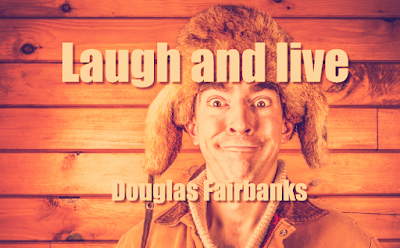Laugh and live (1917)
Excerpt:
It is all a state of mind, I tell you — and I'm sure of what I say. That's why I have taken up my fountain pen. I want to talk to my friends — you hosts of people who have written to me for my recipe. In moving pictures all I can do is act my part and grin for you. What I say is a matter of your own inference, but with my pen, I have a means of getting around the "silent drama" which prevents us from organizing a "close-up" with one another.
In starting I'm going to ask you "foolish question number 1." — Do you ever laugh? I mean do you ever laugh right out — spontaneously — just as if the police weren't listening with drawn clubs and a finger on the button connecting with the "hurry-up" wagon? Well, if you don't, you should. Start off the morning with a laugh and you needn't worry about the rest of the day. I like to laugh. It is a tonic. It braces me up — makes me feel fine! — and keeps me in prime mental condition. Laughter is a physiological necessity. The nerve system requires it. The deep, forceful chest movement in itself sets the blood to racing thereby livening up the circu- lation — which is good for us. Perhaps you hadn't thought of that? Perhaps you didn't realize that laughing automatically re-oxygenates the blood — your blood — and keeps it red? It does all of that, and besides, it relieves the tension from your brain. Laughter is more or less a habit.
To some, it comes only with practice. But what's to hin- der practising? Laugh and live long — if you had thought of dying — laugh and grow well — if you're sick and despondent — laugh and grow fat — ^if your tendency is towards the lean and cadaverous — laugh and succeed — if you're glum and "unlucky" — laugh and nothing can faze you — -not even the Grim Reaper — for the man who has laughed his way through life has nothing to fear of the future. His conscience is clear. Wherein lies this magic of laughter?
For magic, it is — something that manufactures a state of felicity out of any condition. We've got to admit its charm; automatically and inevitably a laugh cheers us up. If we are bored — nothing to do — just laugh — that's something to do, for laughter is synonymous with action, and action dispels gloom, care, trouble, worry and all else of the same ilk. Real laughter is spontaneous. Like water from the spring, it bubbles forth a creation of mingled action and spontaneity — two magic po- tions in themselves — the very essence of laughter — the unrestrained emotion within us! So, for me, it is to laugh! Why not stick along? The experiment won't hurt you. All we need is willpower, and that is a personal mat- ter for each individual to seek and acquire for himself. Many of us already possess it, but many of us do not. Take the average man on the street for example. Watch him go plodding along — no spring, no elasticity, no vim. He is in check-rein- — how can he laugh when his pep is all gone and the sand in his craw isn't there any more? What he needs is spirit! Energy — the power to force himself into action! For him, there is no hope unless he will take up physical training in some form that will put him in normal physical condi- tion — after that everything simplifies itself. The brain responds to the new blood in circulation and thus the mental processes are ready to make a fight against the inertia of stagnation which has held them in bondage. And, mind you, physical training doesn't neces- sarily means going to an expert for advice.
One doesn't have to make a mountain out of a mole- hill. Get out in the fresh air and walk briskly — and don't forget to wear a smile while you're at it. Don't overdo it. Take it easy at first and build on your effort day by day. A little this morning — a little more tonight. The first chance you have, when you're sure of your wind and heart, get out upon the country road, or cross-country hill and dale. Then run, run, run, until you drop exhausted upon some grassy bank. Then laugh, loud and long, for you're on the road to happiness.
Douglas Elton Fairbanks Sr. was an American actor, screenwriter, director, and producer. He was best known for his swashbuckling roles in silent films including The Thief of Bagdad, Robin Hood, and The Mark of Zorro, but spent the early part of his career making comedies


